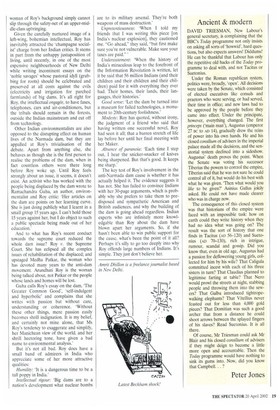Ancient & modern
DAVID TRIESMAN, New Labour's general secretary, is complaining that the BBC's Today programme not only insists on asking all sorts of 'howwid', hard questions, but also expects answers! Diddums! He can be thankful that Labour has only the repetitive old hacks of the Today programme to deal with, and not Tacitus or Suetonius.
Under the Roman republican system, politics were, broadly, 'open'. All decisions were taken by the Senate, which consisted of elected executives like consuls and praetors who were serving, or had served, their time in office; and new laws had to be approved by the people before they came into effect. Under the principate, however, everything changed. The first princeps ('main man'), Augustus (emperor 27 BC to AD 14), gradually drew the reins of power into his own hands. He and his closed consilium of advisers in the imperial palace made all the decisions, and the senatorial system declined into a sideshow. Augustus' death proves the point. When the Senate was voting his successor Tiberius the powers to control the empire, Tiberius said that he was not sure he could control all of it, but would do his best with what he was given. 'Then what would you like to be given?' Asinius Gallus jokily asked. He could not have made clearer who was in charge now.
The consequence of this closed system was that historians of the empire were faced with an impossible task: how on earth could they write history when they had no idea what was going on? The result was the sort of history that one finds in Tacitus (AD 56-120) and Suetonius (AD 70-130), rich in intrigue, rumour, scandal and gossip. Did you know that, even in old age, Augustus had a passion for deflowering young girls, collected for him by his wife? That Caligula committed incest with each of his three sisters in turn? That Claudius planned to legitimise farting at table? That Nero would prowl the streets at night, stabbing people and throwing them into the sewers? That Galba introduced tightropewalking elephants? That Vitellius never feasted out for less than 4,000 gold pieces? That Domitian was such a good archer that from a distance he could shoot arrows between the splayed fingers of his slaves? Read Suetonius. It is all there.
Of course, Mr Triesman could ask Mr Blair and his closed consilium of advisers if they might deign to become a little more open and accountable. Then the Today programme would have nothing to sink its gums into. Now, did you know that Campbell... ?
Peter Jones






































































 Previous page
Previous page